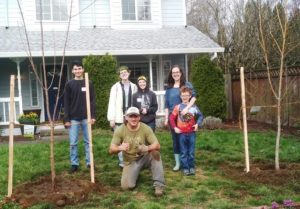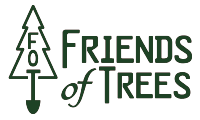Tag: interns
DukeEngage Interning at Friends of Trees
Hey everyone! My name is Alex and I am the Friends of Trees DukeEngage Intern for summer 2019! I am a rising sophomore at Duke University (Go Blue Devils!). For those of you who are unfamiliar with the program, DukeEngage is a program that provides over 400 Duke students with the opportunity to complete service and civic engagement work domestically and abroad for 8 weeks of the summer with all expenses paid. For the past 8 weeks, I have been working with Friends of Trees for my non-profit experience.
I put Friends of Trees as my top choice for non-profit placement because I loved the idea of chilling out and working with trees all summer. In fact, working with a tree organization seemed especially fitting given that I had gotten tree tattoo last summer, which upon working at FoT I’ve realized looks a whole lot like a Doug fir (don’t worry Mom, I haven’t gotten any more tattoos since being in Portland).
I would like to take this blog post as an opportunity to reflect on how much I have grown and what I have learned since starting my internship with FoT.
I didn’t actually get to plant any trees.

So this lesson probably shouldn’t have been as much of a shocker to me as it was. After telling my friends and family that I would be planting trees in Portland for 8 weeks, I was surprised to find out that the summer is actually not the planting season, and instead we do maintenance on trees from previous plantings. Still good! I do have to explain to everyone that I actually have not planted any trees this summer– oops! However, the work we do during the summer is still extremely important to the restoration and growth of riparian areas. This summer I learned that Friends of Trees is contracted by the Portland Bureau of Environmental Services and other watershed councils to plant alongside watersheds and rivers. Trees are super important in maintaining water quality because they provide shade which cools the water and the roots suck up pollutants which keeps the water clean. Both of these services are essential to maintaining a healthy ecological balance in nature, but it’s also essential for maintaining Portland’s drinking water quality. This leads me to my second lesson–
I (possibly) know what I want to do in life!
Towards the end of my freshman year I was feeling extremely conflicted about what I wanted to study and where I wanted college to take me. I had completed my first year in the Pratt School of Engineering, which was to put mildly, really, really difficult. It was hard to combine my passion of environmentalism with my passion for math and science. After a horrific failed attempt at computer programming and electrical engineering, something I believed was necessary to follow my dream of working on renewable, clean energy, I was feeling discouraged as to how exactly I was going to make a difference in the world. Enter Friends of Trees. Learning about the ways in which ecological restoration helps maintain water quality for the city of Portland, I realized that there are ways I can promote environmental well-being at a regional level as an environmental engineer. Working with FoT, I realized that local work can make a huge impact for nature and people alike. This newfound knowledge has motivated me to stay within engineering and one day I might be on the other side of the partnership for ecological restoration.

Working at a non-profit is hard, but it’s worth it
One of the main reasons that I chose to do DukeEngage is because I didn’t think that I would have a chance to work at an environmental non-profit again in my near future. Portland has a big non-profit culture, which is one of the reasons I love this city. It feels like everyone here is working to make other’s lives better, not for the sake of doing service, but because that is what we are supposed to be doing. That being said, working at a non-profit is not easy. Trees don’t necessarily have capital in our society. Their economic and environmental benefits (such as greatly reducing energy costs, air pollution, and emotional stress) are often overlooked. Many people don’t feel the need to “invest” in trees.But, there is an intrinsic value that comes from working at a non-profit. I think one of the most important lessons I learned here is that there is so much more to life than making a ton of money. It is cliche, I’ll admit. Portland, with its proximity to so many natural areas and its low stress culture provides almost a supplemental income that I believe is overlooked by a lot of ‘East Coasters’. I’m not going to lie, there were many days when I was working in the field and thought to myself “I really need a college degree to cut down blackberry?” The answer, in short, is yes if you want to do it in Portland. This summer has taught me that I want to come back to the Pacific Northwest. There is a reason that there are only a few people at FoT that originally hail from here, most come from all over the country. And spending the summer here has really allowed me to realize that reason.

In conclusion
When I first came to Portland to “work with trees all summer”, I never could have imagined how much I could learn, reflect, and grow, during my 8 weeks at Friends of Trees. I didn’t know that I would meet so many funny, caring, and passionate people at my job. People that would influence me to think more deeply about what I wanted from the world and how I could make my personal impact. And yes, I did spend many hot days in the sun being poked by blackberry, or accidentally walking through a patch of stinging nettle, or hauling heavy buckets of mulch and reaching my goal of 10,000 steps a day well before noon. But, I learned so much more than how to identify native plants and how to use Salesforce (which are two very important skills that I am grateful to now have). I learned that there is so much meaning and beauty in the work that Friends of Trees does.. So maybe this won’t be my last time working for a non-profit, but I am so happy and thankful that I got to spend my summer working with Friends of Trees.
Peace out Portland and FoT! It’s been a wild ride ♥ – Alex B
Adult Urban Forestry Program provides interns with skills & experience

At Friends of Trees, we are committed to doing everything we can to help our community gain access to the benefits of trees. We are also committed to making our green workforce accessible to all groups of people through the Adult Urban Forestry Training & Internship Program.
As first shared in our November 2018 edition of Treemail, the UF Training Program, funded by the East Multnomah Soil & Water Conservation District, is a 12 week paid training program focusing on urban forestry and restoration topics. Program participants were selected by local Community Benefit Organizations (APANO, POIC, Verde, and Wisdom of the Elders) that are also Friends of Trees partners. Program participants attended weekly training sessions focusing on landscape design, tree identification, tree maintenance, ecological site design, environmental justice, and careers in urban forestry.
We are now in the first full year of the UF Training Program. The 10-week training program was completed in the fall, followed by the coordination of internships at host sites for program participants. The goal of the entire program is to help people who are interested in the urban forestry and restoration fields gain meaningful work experience and exposure to the field so they can pursue higher education opportunities and higher-level jobs.
We are almost complete with the internship portion of the program, with interns working at varying sites in Portland, Beaverton, and Vancouver, including Honl Tree Care, Portland Parks and Recreation, Verde, and Friends of Trees. Two of our interns, Bruce and David, have been interning with the City of Vancouver’s Urban Forestry program; their internship supervisor, Jessica George, Education and Outreach Coordinator for Vancouver’s UF Program, shares how valuable Bruce and David were to the Urban Forestry team this winter and spring:
“We truly enjoyed hosting two spectacular interns through Friends of Trees,” shares Jessica. “David and Bruce were dedicated to getting the job done–and done to an impeccable standard. David and Bruce supported winter planting projects, pruning and mulching young trees in parks and along streets, and they installed plaques on the new Heritage Trees. Along the way they interacted with other City staff, community members, and dedicated volunteers, while representing Wisdom of the Elders, Friends of Trees, and the City of Vancouver seamlessly. We appreciate their work ethic and that they were open and willing to learn and support Urban Forestry.”
The interns also get a lot out of the experience. Many participants had some exposure to the urban forestry field but hadn’t received upper level mentorship or hadn’t been exposed to the different levels of work involved. When asked about their experience working with Vancouver Urban Forestry, both Bruce and David highlighted the community-building aspect of urban forestry and tree planting:
“It was great to work with that spectrum of the field, with the Urban Forestry department specifically. I never realized it was more than just trees and plants, but it’s also people. The bond that the City builds with residents is really awesome.” –Bruce, UF Intern
David echoed the same sentiments when describing his experience, “My experience was really great. The thing I liked about it was the work we did with the community at planting events. Vancouver UF works with different people and communities and when we plant new trees, it is at community-based events so we can make a bond with the people we work with.”
We are grateful for community members like Bruce and David who are so passionate about making our environment a better place, and for partners like Vancouver Urban Forestry who help make that possible. We look forward to sharing more about this program as is continues and grows, stay tuned!
Picture above, in front, UF Program Intern David at a recent Vancouver planting event with happy tree recipients.
